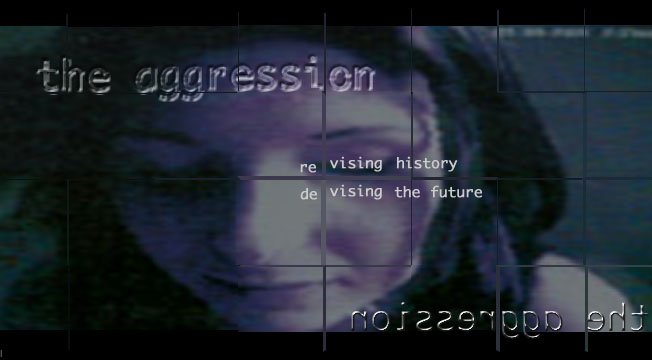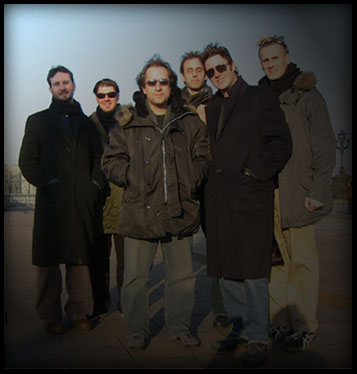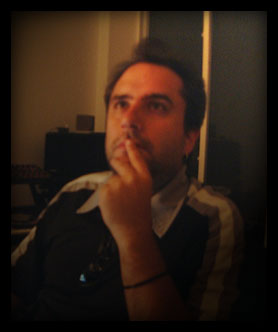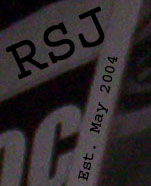|

There was a brief period of time in the mid-90s when the industrial influence could be heard on mainstream radio. Nine Inch
Nails was huge, bands like Stabbing Westward and Gravity Kills had radio hits, a lot more teenagers started wearing fishnets
-- machine rock was the "it" sound. So began the onslaught of generic bands with some variation of hard guitars
and synths. And because that's just how it goes, the people who never had definitive hits tended to be the artists that were
busy innovating while others were duplicating a sound that it seemed possible to have a hit with. These are also the people
who are still pushing the envelope today.
Having released the aggression's debut in 1997, FJ DeSanto is one of the people still committed to innovating the scene.
Though currently focused on his new project, Hypefactor, as well as his collaborations with others, he is about to release
a remix cd of the aggression's work on Digital Brothel Records. Rock Star Journalism has an in-depth discussion with the
aggression's founder about his band's history and what he has in store.
Rock Star Journalism: You have a new remix album, Revisionist History, on the way. When do you expect this to be released?
FJ DeSanto: I think we're hoping to see it out in the next few months. We have all the remixes in hand; it's just a matter
of mastering and scheduling. I was literally just speaking with Rob [Ferent] at Digital Brothel about this, so it should be
sooner than later.
RSJ: You have a pretty diverse group doing the remixes -- how did you get involved with the people who worked on this
album?
FJ: It varies from remixer to remixer. Some, like Leo from Gromet, are old friends, while others, like K-Nitrate, are
people we've met during our adventures abroad. Dubsinthe, who are from Russia, opened for us in St. Petersburg, and we became
fast friends despite the language barrier. It seems "remix" is a universal word! Needleye comes into the picture
via our pal Gilez at Armalyte, who put us on a bill with them in London a few years back. Each remix has its own backstory.
In most cases, the story about how certain remixes came together is almost as interesting as the remix itself.
RSJ: What's your favourite of the remix stories?
FJ: My favourite took place in St. Petersburg, Russia when were playing shows there. We were in a small bar with some
of the other bands and one guy, who spoke no English whatsoever, was frustrated because he wanted to talk with me about music.
We couldn't really communicate, but when someone said the word "remix" we had finally found one word we both understood.
It was hilarious. Then he went to jail before his band could open for us, but was let out as we were preparing to leave St.
Petersburg the day after our gig. He literally ran from prison to the train station to see us off. He hugged me, gave me a
thumbs up and said only one word..."remix." Priceless.
RSJ: How did you get involved with Digital Brothel Records?
FJ: A friend of mine, Todd Ryan, told me about the label and thought there could be a fit. Todd served as an intermediary
and went back and forth between Rob and I. It quickly became apparent that something exciting could happen. Rob and I got
to talking, and in a matter of hours, a deal was set!
RSJ: Why did you choose DBR to release your next album?
FJ: I think it boils down to Rob's enthusiasm for the aggression and music in general. It's nice to work with someone
who thinks outside the box. There are a lot of people who do a lot of talking, but guys like Rob and Gilez are people who
are out there actually making things happen.
RSJ: Are you still associated with Tinman Records?
FJ: We're no longer associated with them other than their handling our back catalog. I've had very little contact with
them in the past year, and I am under the impression that the label has run its course. We had a good run with them, and I
respect [Tinman owner] Jeff Johnson immensely as a friend and supporter of the aggression.
RSJ: Do you feel that the lack of a Wax Trax style industrial label has significantly hurt the ability for artists within
this community to get material released?
FJ: I wouldn't say it's as much a lack of labels as it is the lack of distribution that has hurt many labels and bands,
including my own, for years. The Internet has become a great method of distribution for new music today. It's immediate and
it's exciting, but I still think fans of this kind of music would go into a record store and purchase an actual CD if it was
something they could walk into a local Best Buy and get. Without that distribution, a lot of great bands have suffered and
not received the attention they deserve.
 RSJ: When do you think you'll be putting together the next album of original material?
FJ: Honestly, it's difficult to say when and if that will happen. We've recently put the aggression on hold for our other
projects: my band Hypefactor and Ash [Venezia] and Robin [Emmet's] band In Loving Memory. We have to see where those wind
up before we can even remotely consider working as the aggression again. In my heart of hearts, I feel the aggression might
have one more great album in them. Should there be another aggression album, it will be a record that stays true to its machine
rock roots and is made by people who are committed to making a great album. Right now though, my focus is on Hypefactor, but
aggression is always an active part of my consciousness.
RSJ: When you talked about recording Flood, you said that you had an idea of where that album was going long before you
even started on it. Would you say the same is true of your next project?
FJ: Not at all! Flood was a unique album for me. Unlike the two previous albums, Whitelineoverride and Pure Liquid Ego,
Flood wasn't made with the intention of impressing a scene or a label. It was the first time we stopped worrying about what
people expected from us, and I think a weight was immediately lifted. Without those restrictions, we were able to free ourselves
and make what I feel is the definitive aggression album. I had seen so many of our peers strike out trying to make music for
a specific audience or marketplace that it became something I needed to avoid. It was written and recorded during a time
when everyone in the band was on the same page and focused on making something very special. That was very rare, and I think
we captured that moment of time on CD. Despite some cringe-worthy moments with some of our earlier material, I'm extraordinarily
proud of the aggression's output. However, nothing makes me more proud than Flood. It an incredibly underrated album, if I
do say so myself. It's probably one of the best records you've never heard.
RSJ: The aggression has been described as a coldwave band, as well as a machine rock band, and some classify you with
EBM and synthpop. Do you think any of these are accurate descriptions of your music? How would you describe your sound?
FJ: I think every one of those descriptions could be applied to the aggression in some way. Our approach was to always
do what was best for the song. If it meant adding a lot of guitars, so be it, and if it meant adding more synths, then that
wasn't a problem either. It was always a goal to create albums that were musically diverse, yet cohesive. I wanted to run
the entire gamut of the genre, and I think we were very successful to that extent. I was always puzzled by these bands who
limited themselves by being "anti-guitar" or "anti-synth." It seemed pointless and really fucking stupid
to cut yourself off from any kind of instrument that could help make your music better.
I was never one who was ashamed to call the aggression an "industrial band," but that was probably because I
felt a kinship to the people, bands and labels associated with that particular scene. Classifications are bullshit. You're
either good or you're not. Fortunately, we were great. I always thought of us simply as a rock band, but if I was forced to
choose one of your descriptions, it would be machine rock.
RSJ: In an old column on your site you talked about the industrial scene being dead. Do you still feel that way?
FJ: I think what I wrote was about the scene I grew up in more than the entire industrial scene in general. The aggression
was born into a world where there were labels like FCR, Wax Trax and Reconstriction who had bands that toured and put out
records regularly on a national level. The Internet hadn't really taken off yet, so you really had to get out to the clubs
and record stores in order to hear the new music and meet your peers or you missed out. The potential seemed enormous. I'm
not a nostalgic guy, but I appreciate a lot of good that came out of being a small part of that world.
I think what's really hurt this genre is the lack of new talent and new ideas. A lot of the important bands like Chemlab
burnt out (no pun intended) and things have been stagnant for years. Today, I think for the first time in 7 or 8 years, some
new bands are emerging that are exciting and talented and are looking to push things forward. Also, a lot of names from the
past, like Die Warzau, have returned to show everyone how it's done. I think the potential for a resurgence is there, but
I think it has to be the younger kids, like Cyanotic, who make that happen.
RSJ: In the early days, you recorded at the Warzone in Chicago, an area that is associated with many of the genre's most
influential acts. Did you find this scene conducive to creating your music?
FJ: We got a terrific education during our trips to the Warzone. To the aggression, particularly [co-founder and former
guitarist] Mark Mohtashemi and I, Chicago was the fucking dream. It was the Holy Land and it still holds a very special place
in my heart. We were just out of our teens and going to Chicago to work with the people whose records we owned was a huge
thrill for us. As I was talking about earlier regarding the Internet, technology at that time was limited and affordable home
recording was still a few years away. To get the sound we wanted, we had to go into a professional recording studio with brilliant
people like Van Christie (Die Warzau) and Jason McNinch (Lick). How the hell do you not learn when you're in the room with
guys like that? Recording at the Warzone gave us a credibility that we could never have gotten anywhere else. When we came
back to New York with our first Warzone demo, the labels started calling.
RSJ: Often the people who were actually the most influential in a genre are not the ones who are remembered. Who do you think
was the most influential industrial band that doesn't get the credit they deserve?
FJ: Chemlab were the most influential band on me personally, but fortunately, they are still remembered fondly by the
fans, and Jared [Louche] is back in action. I think the band that had the most impact on me that gets zero credit was Virus
23. They were fucking tremendous. Up until a certain point, V23 were managed so well that I thought they were going to bring
industrial rock to the mainstream. They were a constant presence in New York. You couldn't avoid them. They were beyond cool
and pumped out some truly amazing songs. Stuff like "Take It" and "Black Skies" were enormous songs, but
they never had that definitive album that made people take notice. I think that's why they aren't as highly regarded as they
should be.
While you've got me thinking, I also think that there's one true unsung hero in this genre and that's Jamie Duffy. This
guy has given his heart and soul to all things industrial and has worked on a million records and tours just cause he loves
it. He picked up where William Tucker left off in that you know something is cool and interesting if he's involved. I've worked
with him on almost every record I've done, and while he often makes me fucking mental and disappears for extended periods
of time, his contributions are immeasurable. I've been begging him to do a solo record for years. I'll be very upset if that
never happens. He's the patron fucking saint of machine rock and I love the guy.
 RSJ: You have a regularly updated blog -- do you find that this serves the purpose of making you feel closer to fans on a
more personal level?
FJ: I think that it serves a purpose, but it wasn't my sole intention. I kept digging up old E-mails or notepads with
ideas that never happened, and I realized that having a blog would be an interesting way of keeping tabs on my erratic train
of thought and serve as a record of how the music I was working on was evolving. It was also something I could share with
friends or people who followed the band. It's become a great way for all of us to fight. I hope to go back over it someday
and have a good laugh at it.
RSJ: Looking at the best of 2004 list posted in your blog, you seem to have a heavy interest in the British music scene.
Do you think there is more support overseas for those working outside the mainstream?
FJ: Absolutely! All of our trips overseas, from England to Russia, were very successful. We always played to appreciative
and larger audiences overseas, and I chalk that up to the fact that there is a deeper appreciation for music than there is
here. Music is treated like the art form it really is, and less emphasis is placed on categorization. We're always treated
like kings overseas, even when we thought we were going to get killed in Moscow -- but that's a story for another time.
RSJ: One of the things you discuss appreciating about England's Razorlight is the improvisation in their live show. Is
that something you feel is important in the aggression's live performances?
FJ: It certainly became a very important element of the aggression live show, especially when Robin came on as our drummer.
With her, the aggression evolved into a real force. I think any band worth its weight needs to be able to play. We always
tried to make the aggression as "live" as possible. If something could be played by a human being, it was played
and played well. Obviously, we had to play to a DAT for a lot of the songs, but towards the end of our last round of performances,
the backing tracks were down to the bare essentials, and we had written new material that was not DAT based, yet were electronic
and were trademark aggression. There's nothing I hate more than seeing "bands" that consist of a singer and a guy
miming keyboards. That's not a reflection on the music itself, but I certainly feel an effort should be made to make a live
show as live as possible. Depeche Mode, for example, were extremely successful at doing this and were a big influence on our
approach to live shows.
RSJ: You have a multitude of side projects going, including the aforementioned Hypefactor. What's happening with that
band at the moment?
FJ: Hypefactor is actually the main band these days. We released an EP on Tinman, called The Distracted Lover that was
really well-received by the few critics who heard it, but the collapse of Tinman really hurt the EP in terms of getting it
the promotion and attention it deserved. We're about to start mixing the first full-length album, Exit Strategies, and after
that, we'll put the live band together. I'm happy to report that the Hypefactor album features not only myself and [former
aggression soundman] Brandt Gassman, but also Robin, Ash and awesome bassist Charles Labarbara. They've all taken significant
roles in the recording process. They should all be part of the live band, if I'm lucky, and I'm hoping to recruit [former
aggression keyboardist and co-lyricist] The Kidd to put his novel on hold and come out of retirement.
RSJ: What do you get out of this project that you don't get out of the aggression?
FJ: I think Hypefactor allows me to be myself and make the kind of music I feel like making without the limitations of
genre or expectation. The band is a fresh start and really a true representation of where my musical roots are and where I'm
at today. It's electronic, but it's certainly not industrial. Making Exit Strategies has been very challenging, but very rewarding
at the same time. Hypefactor is going to be around for a long time.

RSJ: You also worked with Jared Louche on Chemlab's most recent release, Oxidizer. How did you get involved with him and
what was this experience like?
FJ: I've known Jared ever since I, as an impressionable teenager, saw Chemlab open for Nine Inch Nails. I was hooked on
the spot. I immediately struck up a friendship with Jared -- letters, phone calls, the whole thing. There was no one better
than Chemlab. Ever. They always seemed like an out of control train ready to derail. Those same elements that made them so
dangerous and exciting also fucked them, but I genuinely loved every second of it.
Jared was a very early supporter of the aggression and was the first person to offer us a record deal. I'll never forget
him approaching us at Limeight saying "you guys belong on FCR." We were ecstatic. Whiteline was supposed to come
out on FCR originally, but the label's problems made it so that had we signed our three record deal, nothing we ever did would
come out, so we had to pass on it.
After Chemlab split, I stayed friendly with Jared, and over the years we were able to get to know each other beyond just
being two guys in bands. Each time I would see him in London, I would constantly harass him to get Chemlab back together,
but Dylan [More's] reluctance made that impossible. When he finally decided to work on a new version of Chemlab with the
guys from Cracknation, he asked me to be a part of it. This was a big reason why the aggression went on hiatus. I was so flattered;
it was like being called up to the Major Leagues. I had a super time being a part of Oxidizer, and I'm really proud to have
had the privilege to contribute to such a terrific album.
RSJ: Do you think you'll be working on Chemlab's next album?
FJ: I'd be pissed if I wasn't! Jared's asked me, and it wasn't the most difficult question I've been asked. I wouldn't
miss it.
RSJ: Will you be going out with them when they tour?
FJ: I've been asked to do that also. It depends on scheduling and if it can actually happen. The logistics of a Chemlab
tour are really fucking tough. Honestly, if it does happen, it's not gonna be any time soon. Just on geography alone, it's
a bitch to put together. Believe me, a Chemlab tour is something I would love to see and kill to be a part of.
RSJ: Speaking of Chemlab-related touring experiences -- if H3llb3nt ever performs together again, can we look forward
to you getting on stage for some more impromptu backup dancing?
FJ: Holy shit, have you guys done your homework! Blame Jared. He should have known better than to drag my drunk ass up
there.
 RSJ: There's also a mention on your site of working on an album called Shatterpieces with Jared, which he has described as
an album of just sutures. What's the status of that project?
FJ: We started it last year, but it's taken a backseat to another Jared related project. I think the regulars at the Hydrogen
Bar will be very forgiving when they hear why, and that should be very soon. I'm gonna get around to Shatterpieces sooner
than later.
RSJ: Do you have any current tour plans for the aggression?
FJ: None at the moment. We spent the better part of ten years locked up together, and with the immediate focus being In
Loving Memory and Hypefactor, I think it could be awhile before we see the aggression onstage. Unless of course, some insane
promoter from a foreign country came to us with an offer to play. The aggression can NEVER say no to a foreign adventure.
RSJ: Who is still considered part of the aggression line-up as of right now?
FJ: The aggression's probably just me right now! I don't mean that in a bullshit egotistical way. We're pretty much all
still working together, but the current album and any aggression business beyond it, such as remix work, etc, is all being
handled by me. We have a gang here, which we call the MOGpac, and people come in and out of the various projects we produce.
If and when the time comes to do an aggression album, I'll make the call to see who wants to step up. However, I'd be heartbroken
if a future aggression album didn't have Ash or Robin involved. Those two are indispensable. I'd also like to see my original
partner in crime, Mark, come back for one last round, to bring it all full circle.
RSJ: You've had your share of problems keeping a consistent line-up together for your band -- just when it seemed that
you were on your way, the band ran into a lot of personal problems. What do you think has been the greatest obstacle to your
success?
FJ: I don't think we've had line-up problems as much as we have had a revolving door of talented people coming in and
out of the band over the years. It's all been very casual. Even when Mark left after EGO, the aggression continued without
a hitch. In fact, losing and gaining members kept the aggression fresh and constantly challenged. We've all had our personal
problems over the years but we were good at keeping the shit outside of the band. We've been really fucking fortunate. I'd
say the manager was more of a drama queen than anyone in the band.
I think the greatest obstacle to achieving a higher level of success was the lack of the proper resources to really promote
and tour our records. That's not a knock on Tinman, but most indie labels in general. Also, I think we put out music that
required a lot out of the listener but rewarded them for their efforts. Maybe we were too diverse for our own good, but I
always saw that more as showing a broader range than most bands. You either got it or you didn't. And obviously, those few
with taste and intelligence got it! (laughs)
RSJ: What has most kept you going?
FJ: I need to. It's in my blood and it's my life. I don't think it requires any explanation beyond that.
|

